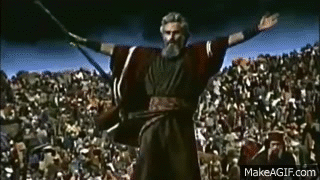This quote from Exodus because of the political situation it proposes. This is the pharaoh of Egypt that knows not of Joseph and so he severely misunderstands the Jewish people under his rule. He wishes to stop their expansion because he is afraid that they will eventually find an enemy nation and attack Egypt with this outside force. The Israelites are getting too big and their growing numbers represent their growing power that can and will be realized by the children of Abraham violently. Their population expansion can be seen in the modern context as a rising economic power like that of modern day China. The Israelites represented the potential for conflict, like in the eyes of many Americans and International Relation theorists, the economic might of China can and is being translated into military power. This military power is seen as a threat to the power of the United States and is the reason why some believe a conflict with China is eminent. But can we learn something from the situation of pharaoh and the Israelites?
"lest they multiply", Pharaoh should know that this is an inevitability that these people will multiply, its God's divine will, they're his chosen people, there is even a covenant between these people and this non-human entity. As Exodus tells us, "Now there arose up a new king over Egypt, which knew not Joseph" Ex 1:8, so obviously he is completely unaware of the agreement and the divine choice and the promise. He is completely under informed about the enemy he is naming, sounds like an American President who could have been a burning Bush if one's pants actually lit on fire when one lies. A common problem between leaders is not knowing your enemy, which we know is a grave mistake, as Pharaoh learned with his relationship with Moses and as America learned with our endeavors in the Middle East (and Vietnam).
Know your enemy. The United States should ensure its well informed on a Chinese enemy if they choose to make China an enemy. That is they should be well informed on China's view of themselves in the international system. As well as understand Chinese culture and traditions; lest America try and punish them, like pharaoh who, "made their lives bitter with hard bondage"Ex 1:14, and then when that didn't work ordered the genocide of Jewish males. If the U.S. trys to enact a modern day punishment against the rising power, like economic sanctions to try and deter the Chinese economy, the equivalent to the hard labor and murder of Jewish children ordered by pharaoh, then America might end up with a stronger China than before, like the Egyptians saw with Israelites.



I find the comparisons between Israelites and Egypt with China and the US interesting. Just as China started as a less-than-powerful country, so did Egypt begin. However, the Israelites ended up becoming a threat, just like China is to us now. It can be important for the US to work with China instead of the opposing them; as we learned from the Israelites and Egyptians, once the Israelites rose to power, they overtook the Egyptians. It would not be in America’s best interest to have history repeat itself with the Chinese.
ReplyDeleteIt is very important to maintain a friendly relationship with China as it is a power rival of the United States. I think in order for the U.S. to ensure a stable relationship they should be engaging in international organizations that include China, as well as the rest of the states in that region. Instead of assuming hostility with China's rapid raising power they should continue a relationship of cooperation in order to avoid violet conflict
ReplyDelete